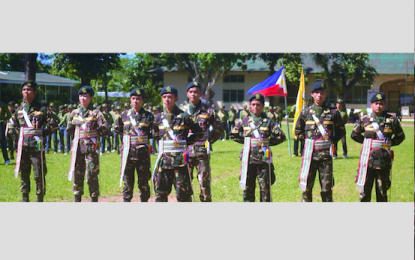
ROTC officers from The Visayas State Uninversity during an exercise. (Photo from www.vsu.edu.ph)
MANILA -- It has been almost two decades since the government made optional the Reserved Officers Training Corps for college students. And this only explains why most youths have only learned of it from social media or even from hearsays.
It is perhaps the reason why some of them do not get full comprehension of why it needs a comeback.
With the government seriously and consistently pushing for its revival, and with the military supporting this move, we ask, do we really have to make ROTC mandatory again?
In the first place, what really is ROTC?
Anywhere in the world, people look up to the military culture for discipline and responsibility.
Perhaps the most progressive and developed nations are also the ones that keep their defenses intact.
A Business Insider report names the United States, Russia, China, France, and the United Kingdom with the most powerful militaries in the world.
These countries have been aggressive in producing more citizen assets -- participation among young people is also notable.
This suggests that military training aims to educate the youth and prepare them to be good citizens. Countries with a strong military foundation are less likely to be attacked.
The figures
Modeled from the US in 1916 during the time the Philippines was under their occupation, military training was introduced to the Philippines.
In 2018, US had the most number of armies worldwide, with 2,363,675. A consistent increase is noted since the last five years.
Meanwhile, in the country, there are only 59,637 graduates from both basic and advanced training of the ROTC in 2015-2016. In 2017-2018, it reached a low of 46,936.
The story behind
Brig. Gen. Rolando Rodil, commander of the AFP Reserve Command, a graduate of the ROTC himself, confessed to being dismayed when Congress moved to repeal it.
“When the ROTC became optional, government sort of abdicated its only opportunity to inculcate the values of patriotism, nationalism, character-building,” he said during the Philippine News Agency’s Pros and Cons episode aired online.
Since 2002, college students are instead required to choose among three NSTP components: the ROTC, the Civic Welfare Training Service (CWTS), and the Literacy Training Service (LTS).
“The other two components failed to really dish that (patriotism, nationalism, character-building) out for the youth,” Rodil said.
As everybody knows, it was the death of University of Santo Tomas student Mark Chua that triggered the program’s abolishment.
“What really went wrong was the abuse. Probably people thought it as an instrument of power. Mark Wilson Chua was an advocate of the ROTC, he was exposing the corruption. He was not against and even his father can attest to that," Rodil recalled.
Call to expedite reservists act
President Rodrigo Duterte has been bugging Congress to expedite the passage of Reservist Employment Rights Act.
The need to do so came after a series of threats from terrorist groups showing interest in Philippine territory -- the same group behind the senseless attack in Marawi City in Mindanao.
With the additional 524 military reservists rendered during the war in Marawi, government soldiers succeeded to defeat the terrorists.
The president, for his part, also expressed emphasis on putting the kind of men that will lead the program.
“The curriculum will only include soldiers of high morale, and has proven their value in the AFP,” AFP Public affairs chief, Col. Edgard Arevalo said in a separate interview.
Excited for a bigger number joining the force, Rodil said the ROTC "may not make you into a soldier overnight but it builds the kind of character in you that will one day become the leaders of this nation”. (PNA)
